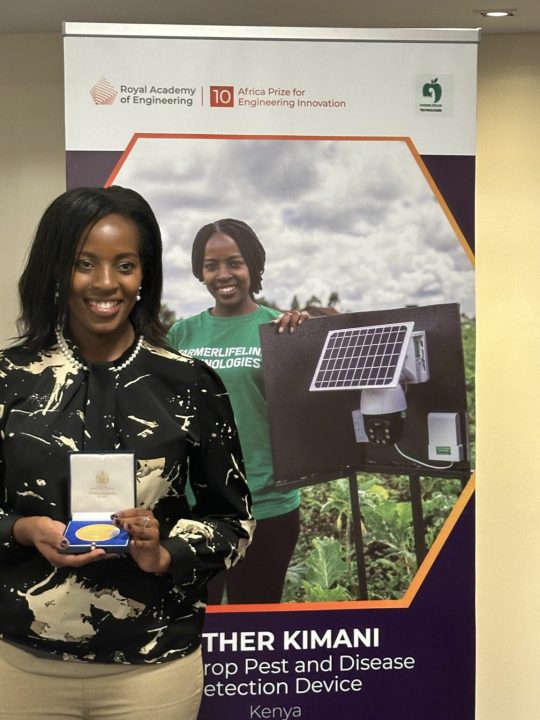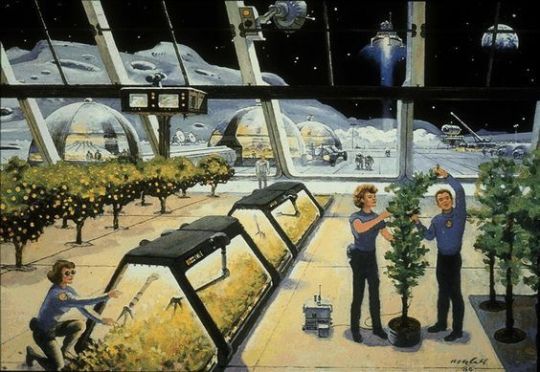#tech and agriculture
Explore tagged Tumblr posts
Text
youtube
Agricultural technology is using technology in agriculture, horticulture, and aquaculture to improve yield, efficiency, and profitability. In this video, we're deep-diving into the fertile fields of tech and agriculture the future of farming. Get ready to witness how groundbreaking technology revolutionizes farming practices, from the seeds sown to the crops harvested!
Agriculture technology, often referred to as "AgTech" or "agricultural technology," encompasses a wide range of innovative solutions, tools, and practices that aim to enhance the efficiency, productivity, sustainability, and profitability of agricultural processes and systems. It involves the integration of modern technologies, such as information technology, data analytics, automation, biotechnology, and more, into various aspects of agriculture to address the challenges and opportunities faced by the global farming community.
Precision farming involves the use of sensors, drones, satellites, and GPS technology to collect and analyze data related to soil composition, moisture levels, weather patterns, and crop health. By gathering real-time information, farmers can make informed decisions about when to plant, irrigate, fertilize, and harvest, thereby minimizing waste and maximizing yields.
Robotic technology is revolutionizing labor-intensive tasks in agriculture. Robots can plant seeds, and weed fields, apply pesticides precisely, and even harvest crops. Automation reduces the need for manual labor, which is increasingly scarce and expensive in many regions.
With the growing challenges of land scarcity and changing climate patterns, vertical and indoor farming systems have emerged. These systems utilize controlled environments, artificial lighting, and efficient space utilization to grow crops in vertically stacked layers or indoor facilities, allowing year-round production and reduced dependency on traditional agricultural land.
The future of farming is undergoing a technological revolution that promises increased efficiency, sustainability, and resilience in the face of global challenges. AgTech solutions are not only changing the way food is produced but also fostering a more interconnected and data-driven agricultural landscape, ensuring that we can feed the world's growing population while safeguarding our planet's resources.
#agriculture#farming#farming technology#future of agriculture#agriculture technology#tech in agriculture the future of farming#tech in agriculture#LimitLess Tech 888#importance of technology in agriculture#agriculture farming#modern agriculture technology#future of farming#the future of farming technology#modern agriculture machine#sustainable agriculture#sustainable farming#technology in agriculture#tech and agriculture#smart irrigation system#vertical farming#Youtube
0 notes
Text
youtube
Agricultural technology uses agriculture, horticulture, and aquaculture technology to improve yield, efficiency, and profitability. In this video, we're deep-diving into the fertile fields of tech and agriculture the future of farming. Get ready to witness how groundbreaking technology revolutionizes farming practices, from the seeds sown to the crops harvested!
Agriculture technology, often referred to as "AgTech" or "agricultural technology," encompasses a wide range of innovative solutions, tools, and practices that aim to enhance the efficiency, productivity, sustainability, and profitability of agricultural processes and systems. It involves the integration of modern technologies, such as information technology, data analytics, automation, biotechnology, and more, into various aspects of agriculture to address the challenges and opportunities faced by the global farming community.
Precision farming involves the use of sensors, drones, satellites, and GPS technology to collect and analyze data related to soil composition, moisture levels, weather patterns, and crop health. By gathering real-time information, farmers can make informed decisions about when to plant, irrigate, fertilize, and harvest, thereby minimizing waste and maximizing yields.
Smart irrigation systems utilize sensors and data analysis to determine when and how much water crops require. This helps prevent over-irrigation and water wastage, resulting in water conservation and improved crop quality.
The future of farming is undergoing a technological revolution that promises increased efficiency, sustainability, and resilience in the face of global challenges. AgTech solutions are not only changing the way food is produced but also fostering a more interconnected and data-driven agricultural landscape, ensuring that we can feed the world's growing population while safeguarding our planet's resources.
Tech in Agriculture: The Future of Farming
#agriculture#farming#farming technology#future of agriculture#agriculture technology#tech in agriculture the future of farming#tech in agriculture#LimitLess Tech 888#importance of technology in agriculture#agriculture farming#modern agriculture technology#future of farming#the future of farming technology#modern agriculture machine#sustainable agriculture#sustainable farming#technology in agriculture#tech and agriculture#smart irrigation system#vertical farming#Youtube
0 notes
Text





Opening of Kangdong General Greenhouse Farm near Pyongyang (March 15th, 2024)
142 notes
·
View notes
Text

��🍚🧬 A new strain of rice offers hope for drought-stricken communities in Chile! Chilean scientists are trialing the “Jaspe” rice strain, described as more environmentally conscious, “less-thirsty,” and “climate-smart.” Trials have also proven the strain to be high-yield with the right growing method, producing nearly ten times more than a conventional rice field!
#good news#crops#climate#climate change#agriculture#climate innovation#climate solutions#rice#plant science#drought#climate resilience#science#climate science#climate research#environment#south america#chile#food tech#food technology#food security#food systems#farming#climate adaptation#hope#hopepunk#hopecore
23 notes
·
View notes
Text
What Makes a Great Agronomist? Unpacking the Traits of Agricultural Excellence
Agronomists are the unsung heroes shaping the future of farming. They’re the bridge between science and soil, the architects of abundance in a world hungry for both food and sustainability. Over the years, after sifting through hundreds of agronomist resumes and meeting countless professionals in this field, I’ve come to realize that greatness in agronomy isn’t just about a degree or a title.…
#agricultural excellence#Agricultural Research#agriculture#agronomist#agronomist traits#agronomy skills#AI soil analysis#collaboration#community impact#crop yield#data-driven farming#drones in farming#eco-friendly farming#Farmer Support#farming innovation#kenya#kenyan farmers#lifelong learning#precision agriculture#regenerative agriculture#soil health#Sustainability#sustainable productivity#tech pioneers#technology in agriculture
12 notes
·
View notes
Text
I feel like there is a strong correlation to Frank Hubert’s initial subtext with Dune (its islamic religious themes, a premise setting an empire against local populaces, the attention towards ecological developments in desert environments with a bias towards temperate zones from outsiders wanting to “enrich” the land), and all of the recent developments in Gaza and its history, both with the original influences to Hubert’s novel and the timing of a blockbuster adaptation happening while international focus grows towards Palestine, that is going unmentioned outside of the usual jokes and memes
#dune#palestine#gaza#free gaza#science fiction#media#Like yes the popcorn bucket is dumb and tone deaf marketing#but like you have a lot of connections#lot of it was very much allegorical to the real like events that took place during the time of the books conception#Including the good guy faction still imposing their own idea of correct environment by introducing a bunch of their own agriculture#When natives to the region do have their own tech and plants to live from#because they know their land and how to live in it#Oh and also spice being a resource being plundered for great profit that a imperial society is reliant on and will kill for
56 notes
·
View notes
Text
This morning a vet tech student came out and learned how to do large animal procedures with us. It was so much fun! 💚

14 notes
·
View notes
Text

Esther Kimani, a computer programmer from Kenya, has won the UK’s Royal Academy of Engineering’s Africa Prize for Engineering Innovation. Her groundbreaking early crop pest and disease detection device wowed the judges, thanks to its remarkable ability to swiftly detect and identify agricultural pests and diseases. This innovative tool can reduce crop losses for smallholder farmers by up to 30% and boost yields by as much as 40%.
Harnessing the power of solar energy, the device employs computer vision algorithms and advanced machine learning to detect and identify crop pests, pathogens, or diseases, and the nature of the infection or infestation. Farmers receive notifications via SMS, making this an affordable alternative to traditional detection methods at just $3 per month—significantly cheaper than hiring drones or agricultural inspectors.
source
#solarpunk#solar punk#africa#ai#solarpower#agriculture#mobile tech#pest#solar power#solarpunk innovation#kenya#women#woman
18 notes
·
View notes
Text
youtube
This is also the reason older generations say younger generations don’t know how to fix things!
#Youtube#some more news#cody johnston#right to repair#big tech#fast fashion#planned obsolescence#fuck apple#john deere#elon musk#Tesla#leftist#leftism#socialism#agriculture#U.S.A#recycling#reduce reuse recycle#plastic waste#tech waste#please recycle#capitalism#late stage capitalism
57 notes
·
View notes
Text
im cooking a chicken thigh for dinner which i got from the farmers market yesterday, the guy who sold it to me said it would be "the best chicken i'll ever eat" we'll see about that
#sasha speaks#he said it's a heritage breed bred and raised at. virgnia tech agriculture school i think?#it was expensive it was about twice the price of regular chicken. but i was drawn in. i was allured#just treating it simply tonight. season salt light flour dredge pan seared then oven baked til cooked through#want to taste this so called best chicken i'll ever eat in as simple a form as possible to really see how it is
6 notes
·
View notes
Text
Samli Drones
AI drones are the way forward for farming! 🌱🚁
These new-age technologies enable farmers to keep track of crop health, lower pesticide use, and make informed decisions for green agriculture. Say hello to cost-saving and environment-friendly precision farming. 🌾
#drone technology#agriculture technology#agriculture drone#farming#crop protection#irrigation#smart farming#ag tech#drones#technology
2 notes
·
View notes
Text
one thing about me is that i am constantly thinking about how saiyans are ambush predators, as opposed to the persistence predators we humans are, and how much of the cultural gap that explains.
#dragon babble#lack of homegrown tech? lack of agriculture? those take time#and the saiyans were okay with where they were at culturally#the human need to improve went mostly into strength for them#they never cared to better their way of life bc there wasn't anything wrong with it#and positive results would take much longer than they care to wait for#explains the impatience of most saiyans
13 notes
·
View notes
Text
Pollinators give us agriculture, food, beautiful gardens... Prevent their extinction in the wild!
#bees#bumblebee#baseball#basketball#cricket#honeybee#honey#agriculture#salt lake city#concordia#barnet#St. Ambrose#Georgia Tech#wild flowers#flowers#pollinators#food
2 notes
·
View notes
Text

🌟 Exciting News from Opulance Technologies! 🌟
Introducing our latest invention: the Advanced Automated Weather Station. This cutting-edge technology delivers real-time, accurate weather data to help you stay ahead of the elements. Perfect for meteorologists, farmers, and weather enthusiasts alike. Discover the future of weather monitoring with Opulance Technologies! 🌦️🔬 #OpulanceTech #WeatherStation #Innovation #RealTimeData #WeatherMonitoring
#iot development services#iot platform#iot tech#iotinnovation#iot in agriculture#robotics#tech#lgbt#iotdevices
2 notes
·
View notes



